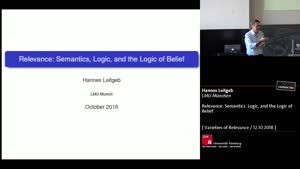Relevance in the Theory of Confirmation - Gerhard Schurz - Universität Hamburg
- Lecture2Go
- Videokatalog
- F.5 - Geisteswissenschaften
- Philosophie
- Varieties of Relevance
Videokatalog
Relevance in the Theory of Confirmation
Workshop: Varieties of Relevance
Abstracts
Insa Lawler: Understanding Why and Answers to Why-Questions
Explanations and understanding why are closely related. Certainly, an explanation could contribute to someone’s understanding. But it is controversial whether explanations must produce understanding, whether understanding always involves some explanation, and whether there can be understanding without explanation. In my talk, I make the case for a moderate form of the thesis that the propositional content of understanding why p is identical to some explanation why p. This thesis is limited to explanations that can be analyzed as answers to why-questions, but it is supposed to hold for the variety of such explanations. I propose that there are two kinds of answers to a ‘Why p?’ question: (I) There are answers that specify something the p-phenomenon depends on in an explanatorily relevant sense. (II) There are answers that additionally specify facts or principles that establish the explanatory connection between the phenomena. My thesis is that the propositional content of understanding why is identical to some answer of the second kind. In my talk, I provide arguments in support of this thesis and I rebut arguments against it.
Gerhard Schurz: Relevance in the Theory of Confirmation
Relevance requirements are vital for every viable theory of confirmation. My analysis starts from a probabilistic account of confirmation including hypothetico-deductive confirmation as a subcase. Going beyond the ordinary Bayesian accounts it is shown that in order to discriminate genuine confirmation from pseudo-confirmation it is necessary to apply relevance requirements to content parts of the hypothesis to be confirmed. In the final part it is illustrated how the proposed relevance criteria can be seen as applications of the so-called replacement account of relevance.
Hannes Leitgeb: Relevance: Semantics, Logic, and the Logic of Belief
I will start by enumerating some ways of reconstructing relevance (subject matter, aboutness, truthmakers) in formal semantics. Afterwards, I will work out one of the proposals in more detail and discuss the corresponding system of logic. In the second part of the talk, I will turn to the sensitivity (or non-sensitivity) of rational belief to matters of relevance. I will suggest that rational all-or-nothing belief is sensitive to (Lewisian) subject matter, while rational degrees of belief are not. The talk will conclude by a new justification of probabilism: assuming that rational degrees of belief are partition-invariant, they must be governed by the axioms of probability.
Hans Rott: Relevance and dependence in classical belief revision and conditionals
In this talk, I present two ideas concerning relevance in the context of the classical theory of belief revision. First, an account of how relevance enters in the evaluation of conditionals that are doxastically interpreted by the so-called Ramsey Test. Stronger versions of the Ramsey Test can be employed in order to move conditionals closer to explanations using the connective ‘because’. Second, an account reformulating the classical theory itself using the notion of dependence – which is here near synonymous to ‘relevance’ – as a primitive. While the accounts themselves are not new, they have been revived recently, and the talk discusses the most relevant advances.
Funding
We gratefully acknowledge the financial support provided by the DFG through the Emmy Noether grant (KR 4516/2-1) and by the GAP.


